
Communicating through social media with community members provides great opportunities to engage with them any time of day.
By Tekla Kilpatrick
Social media is a powerful tool, providing rich opportunities to communicate with community members directly and put people in touch with each other. It can showcase your organization’s work and highlight the role of partners that help create a vibrant community. It is a brand-building tool under your control that you can use to convey your voice and priorities. It allows you to highlight successes, spotlight community progress, and engage the community, and can also preserve connections to previous efforts.
Yet too often, social media posts focus only on timely topics and top-of-mind activities. Being thoughtful and strategic about your feed’s content can help you make the most of social media’s potential to help you reach, inform, and persuade your audience.
Put your organization in the spotlight
Share your latest achievements and highlight completed projects. Use posts to show what you are working on, including ongoing initiatives and maintenance or repair projects that often go unappreciated. Highlighting these projects reminds people of the behind-the-scenes work that makes them possible. To build momentum and support for upcoming projects, create posts leading up to the project, share status updates, and celebrate the project’s completion. If you’re seeking public feedback on a project, consider creating posts with links to surveys. Finally, to promote attendance, posts can include details on in-person meetings.
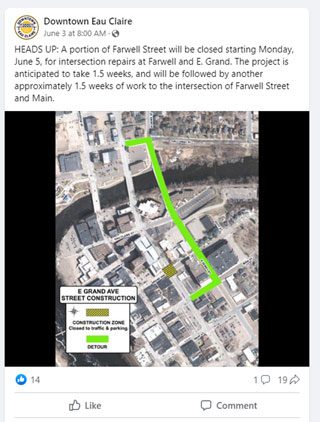
This post from Downtown Eau Claire announces a road closure. It shows a helpful map of the area and estimates the project time. Subsequent posts might announce project updates and completion.
Keep events front and center
Use social media to remind readers about local events and festivals—big and small—and remind followers of your coming season’s event schedule. For example, counting the number of days until an annual event can be a way to build excitement and anticipation.
Event reminders can also focus on registration deadlines or volunteer recruitment. People pay attention to different types of content, so switch up event posts between text, pictures, or a combination. It takes approximately 11 exposures for a person to remember something, so you can’t over-market an event.
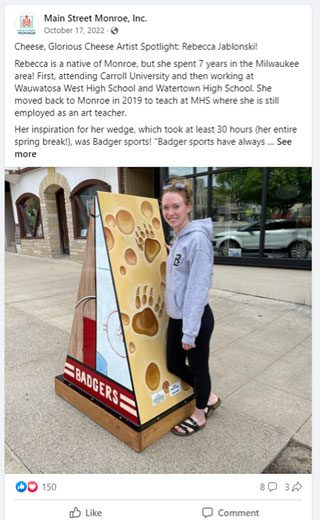
Downtown Monroe, in this post from October 2022, uses content from its “Cheese Glorious Cheese” annual public art installation from the previous summer. This post highlights the event, the local artist, and the community member’s story. Posts like these sustain excitement for the event throughout the year.
Creating pages for events fosters connectivity by allowing people to RSVP. When you create individual events for instances of a series, people can add these to their digital calendars and also easily send invitations to their ow connections. Events can also be added to the top of your organization’s page, making it easier to see your events.
Throughout the year, continue to post photos taken at last year’s event, and throughout the year, thank volunteers involved in making events happen. Posts that feature events and thank sponsors also broaden your audience. Perhaps you will be seen not only by your audience but by people who follow your sponsors, too.
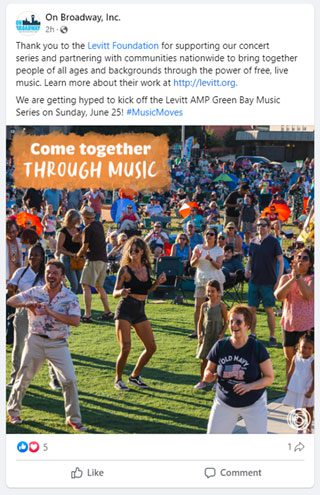
On Broadway Inc. thanks a local sponsor for its support with this post while advertising an upcoming live music series.
Holidays, big and small
When you’re at a loss for content, consider upcoming holidays and create locally relevant content. For instance, point out the number of days left for holiday shopping or feature local spots to celebrate National Dairy Month.
Seek out other monthly celebrations such as cultural heritage months; this allows you to highlight local business owners with diverse backgrounds or those offering unique products or services. Examples of this include Black History Month in February and Asian American and Pacific Islander Month in May. Other months highlight neurodivergences such as April, which is Autism Awareness Month.
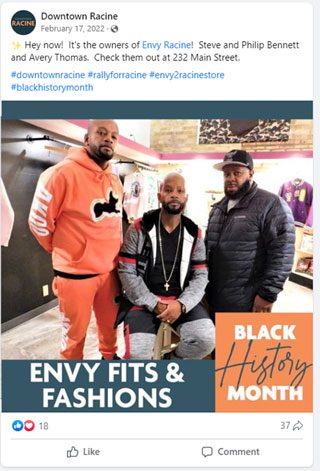
Downtown Racine’s Post for Black History Month not only celebrates Black history but also features the local Black-owned businesses. This focus on business owners was awarded the Diversity and Inclusion Award in the 2022 Wisconsin Main Street Awards. By including a link to the business, this post allows for reaching new audiences that might repost on their own feeds.
And the winner is …
Use social media to spotlight award-winning business leaders or community members throughout the year. Keep community members who win local, national, or industry-specific awards in the public eye. Sharing the variety of awards people in your community receive is a great way to continue celebrating them and help readers know their community better. To highlight unique and noteworthy assets in your community, consider using social media to ask the community for nominations in quirky or timely categories; best comfort food, best patio dining, etc.
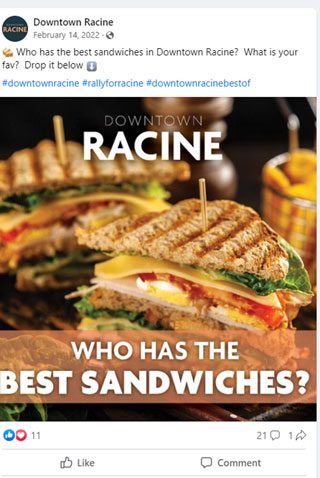
This post by Downtown Racine invites community debate over the area’s best sandwiches. Posts like this create community conversation and introduce people to new businesses.
Boost local business, build connection
Supporting local businesses is vital, and sharing their posts is one way to show support and help them expand their social media reach.
This can be particularly helpful for changes in opening hours, to help raise awareness about this type of change. If a business is seasonal, celebrate reopening or a finished season by sharing posts on when they open or close for the year.
You can also build goodwill by sharing posts of businesses’ anniversaries or other important milestones. Also, if a business is celebrating their employees or customers, help continue the celebration by sharing their accomplishments. This helps connect more people to their products and creates relationships with your community. Be strategic about the posts that you share – over-sharing posts from businesses that aren’t noteworthy or timely can easily overwhelm your feed and drown out critical messages that your audience needs to see. Create a policy for which business posts will be amplified to make it easy to explain your strategy.
It’s important to know that the quicker a post is reshared, the more it is amplified in the social media algorithm. Ask the people you tag in a post to share it as soon as possible. Consistently posting at a certain time or alerting businesses when you post can facilitate timely sharing.
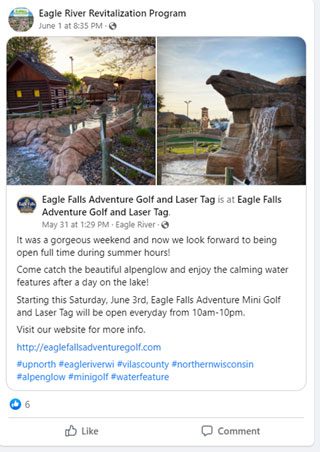
The Eagle River Revitalization Program features a local business and its adjustment to summer hours. This helps the business spread the word on its hours and creates more publicity for the business and the district.
History engages readers
Social media is a great place to share interesting historical facts and trivia; consider this as a topic for posts or videos. For example, most people have no idea how local landmarks got their names. Some of these stories and pictures can also present a chance to partner with a local historical society and local museums and widely share compelling information from their archives.
Each of your downtown buildings has a story to tell. You might research what these buildings used to look like and create posts comparing the past to the present. Similarly, the stories of businesses previously housed in these buildings, alongside the current business occupants, can create historic connection and context.
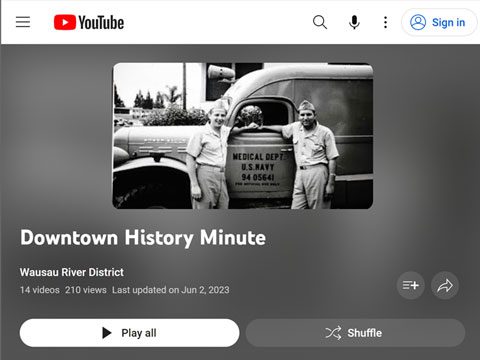
Wausau River District created videos on downtown places and produced a one-minute talk on them. They teach local history and connect past and present Wausau. This project won Best Digital Marketing Effort at the 2022 Wisconsin Main Street Awards.
Focus on the people who make a community
Behind every project, event, and business are people. Social media content can be used to highlight those responsible for making projects happen or whose efforts improve the community.
For projects and events, offer thanks to volunteers by highlighting their actions and the number of hours volunteered. Committees and people who run events can also be featured, reminding readers of the work they do throughout the year.
Social media can also feature business owners and their impact. Interview them about when they started their business, why they sell what they sell, and their story.
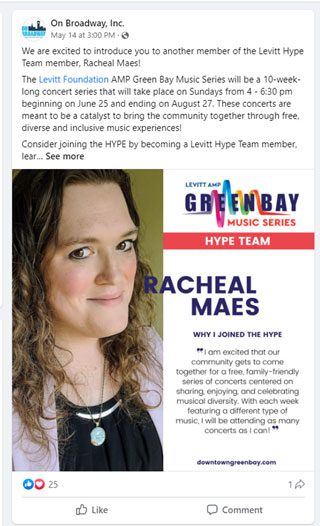
On Broadway Inc. features a team member by posting about why she is excited about an upcoming event. This post features the volunteer, the event, and the sponsor while connecting people to the person in their story.
Local government staff and elected officials can also be highlighted, along with their roles in issues, events, and projects. Social media can be used to highlight the number of years they have been public servants. Engage them and your followers by inviting officials to talk about what a specific project or event means to them on a personal level. Use as many of their words as possible in your post. People value what other people say more than a generic summary.
The Wisconsin Main Street Program recently held a storytelling workshop featuring Phil Eich from Storyville Social. This workshop emphasized the fact that people use social media for community and avoid posts that are overly sales-oriented. Focusing on people first to build relationships and trust will make efforts to highlight events and projects more effective.
Pulling it all together
When seeking to increase engagement, strive to incorporate a mix of writing, pictures, and other content. Social media rewards creativity, so if you come up with a new idea for content, try it.
Planning content in advance can be a good way to ensure your feed has a variety of topics, formats, and styles. It helps to consider creating a content calendar to map out your posts in advance.
There are many types of evergreen content that can help make your social media feed more robust, intentional, and engaging. These include:
- Historic and current photos
- Trivia (try asking a question to have people guess the answer in the comments)
- Tagging someone (try inviting people to tag someone else in a post; use a prompt like “Tag a friend who you want to go with” or “Tag a friend who would like this”)
- Videos (consider using this format instead of text)
- Reposting (share what another business, town, or organization posted)
- Sharing events (create an event page or share an event page posted by a nearby community; feature event volunteers, committees, and sponsors; solicit volunteers or pre-event sign ups; share a countdown)
- Telling interesting stories (subjects can include volunteers, business owners, public employees, and award winners)
Creating engaging content will amplify your voice and engage your community. Don’t underestimate the power of your own voice and the potential you have to deliver your messages in a thoughtful, interesting, and convincing way.

Here’s an example of how to map out social media posts in a strategic way, varying content and attracting readers and followers.
